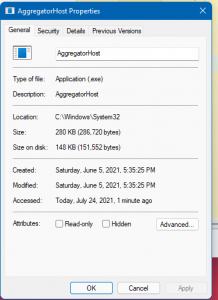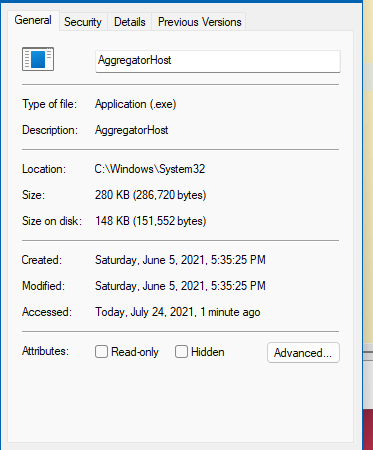What is AggregatorHost.exe & Is it Safe?
AggregatorHost.exe is one of those programs we use every day without even thinking about it. This program helps us manage our different applications running at the same time. But sometimes, this program is installed along with other software and people don’t think twice about installing it. AggregatorHost.Exe is just a normal application like any other. However, there are some instances where this program can become harmful to your system. In this article, I’ll explain what AggregatorHost.ex is and how it can affect your PC.

AggregatorHost.exe: What is it?
The.exe extension on a file names indicates that it’s an executables file. Executable files are used to run programs; you can open one directly in your browser. However, there are many types of executable files, including those that harm your computer. A malicious program called “AggregatorHost.exe,” for example, could potentially infect your system with malware. This article explains what AggregatorHost.exe is and how to protect yourself against it.
AggregatorHost.exe: Is it harmful or safe?
AggregatorHost.exe is a malicious software that might cause some problems to your computer. You don’t know what harm it could do to your system. To protect yourself against potential threats, we recommend you to scan your PC with SpyHunter.
If you think that AggregatorHost.exes is harmless, you’re wrong. There are many reasons why we suggest you to uninstall it.
1. It doesn’t provide any useful function.
2. It slows down your computer performance.
3. It may contain malware files.
4. It may collect personal information about you.
5. It may steal data from your computer.
AggregatorHost is a malicious process, and AggregatorHost.exe is a malicious file, when?
AggregatorHost.exe is a common file used by many applications including Microsoft Office. This file is often found in the system32 folder along with other commonly used executables such as regsvr32.exe. These files are usually innocuous and do not pose a threat to the computer. However, there are times when malicious code is embedded within these files. When this happens, it becomes necessary to understand how to identify and remove AggregatorHost. Exe files.
How did I get the coin miner virus Aggregatorhost.exe?
Coin mining malware is one of the most common threats to computer users today. In fact, it’s so popular that we even wrote about it here on our blog. However, there are some things you can do to protect yourself from such infections. Here are three tips to help you avoid getting infected.
1. Be careful what you install.
You might think that because you trust a particular app store, you don’t have to worry about downloading malware. But it’s important to remember that just because something is free doesn’t mean it’s safe. If you’re unsure whether or not to download an application, always read reviews and make sure the developer isn’t shady.
2. Scan your device regularly.
Malwarebytes Anti Malware is a good choice for scanning your PC. You can use it to scan your phone too. Just plug it into your USB port and let it run automatically. This way, you’ll keep your system clean without having to manually launch the program each time.
3. Keep your software up to date.
If you want to ensure your security, you need to update your operating systems and applications frequently. For example, Windows 10 gets monthly patches; Android devices receive regular OS upgrades; and iOS users get automatic updates. These are critical steps to take to prevent hackers from exploiting vulnerabilities in your system.
How can I get rid of the miner Aggregatorhost.exe from my computer?
The Aggregatorhost.Exe Miner Virus is one of the most dangerous threats on the Internet today. This malicious software is capable of causing serious damage to computers. In addition, it is able to spread itself via USB drives, CDs/DVDs, network shares, removable disks, etc. If left unchecked, it could potentially cause irreversible system damage. Fortunately, there are several ways to remove this threat from your computer without having to pay expensive repair bills.
Aggregatorhost.exe Miner Virus Removal Guide
Step 1 – Uninstall Aggregatorhost. Exe Miner Virus
If you suspect that your computer might be infected with this malware, we recommend that you scan your device with our free scanner. After installing the application, run it once. You will see a list of detected infections. Select “Remove Selected Infections”. After scanning finishes, press “Next”, select “Finish” and let the program do its job.
Step 2 – Delete the Aggregatorhost Malicious Files

Tim Wiley was a tech writer for seven years at Recode. In that time, he covered everything from basic browser.js and URL parameters to XHRs, performance, malware, security, enterprise apps, social media, and Windows secrets. He also written about how to hack Signal in 2016 and how to resist, or possibly even conquer, the zero-day threat.
